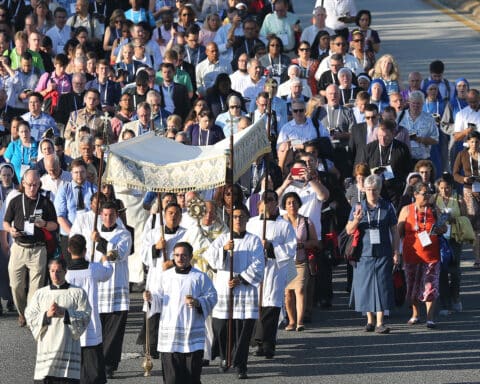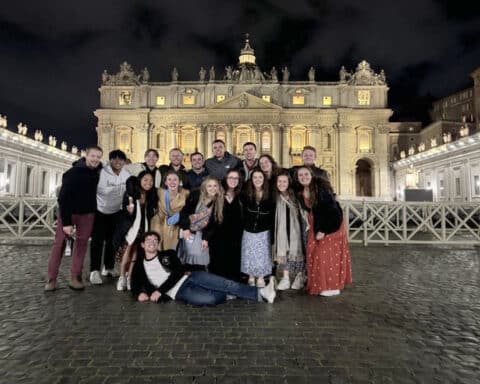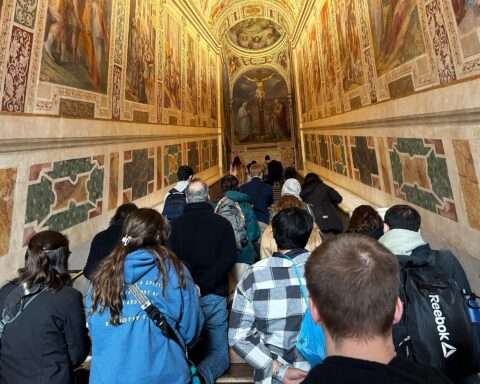Even when my parents started going to church, we didn’t go on Christmas. I think the idea that Christmas was a day to go to church would have shocked them. Church was for Sundays. I’m not sure they would have celebrated Easter if it didn’t fall on a Sunday.
Christmas was a day for home, for family and friends, food and football. A day for enjoying the worldly pleasures without thinking about religion and its duties. A day to play.
And they weren’t exactly wrong.
No abiding city
In this world, we have no abiding city, as the book of Hebrews tells us (cf. 13:14). We move through this world as pilgrims. An American Christmas certainly looks like the family has stopped pilgriming and settled down to stay. It looks like abiding.
The New Testament and the Church Fathers seem to reject the pleasures of the average American’s Christmas day. “This world is not a theatre, in which we can laugh,” St. John Chrysostom declared in a homily, “and we are not assembled together in order to burst into peals of laughter, but to weep for our sins. … It is not God who gives us the chance to play, but the devil.”
That’s obviously true. We should stay alert in the battle against worldliness. We can’t let up. The most dangerous temptations don’t look like temptations.
Complicating matters, though, many of us have a kind of internal Jansenist or Puritan making disapproving noises if we’re not completely focused on something completely religious. We see worldliness in everything, the way someone alone in a house hears every creak as a robber. We can feel God isn’t happy with us if we’re happy.
We need Christmas. I don’t think the lesson from Hebrews rules out the normal Christmas day pleasures. I think of Christmas as the feast day of abiding, of enjoying what good things in the world God has given us, a day to live knowing God wants us to be happy as well as holy and he has given most of us a lot to be happy about.
Yet abiding
There’s a practical reason for this. St. Thomas in his commentary on Aristotle’s “Nicomachean Ethics” says that playing is good for us. “As man needs from time to time to rest and leave off bodily labors, so also his mind from time to time must relax from its intense concentration on serious pursuits: this comes about through play.” He argues that when saints speak so strongly against entertainment, they mean overdoing it.
That’s the practical reason. There’s also a positive one. We just don’t need to play; we’re called to play, and Christmas is a great day for it. The great day for it.
St. John Henry Newman wrote in some notes he’d jotted down for a homily on Christmas: “Christ comes to us as our guest. And coming, He brightens everything. He does not take away, He adds. He adds grace to Nature. If at any time we might love the world, it is now. If at any time, it is when He is come to be our Emmanuel. He makes the world our home, for he deigns to be the light of it. He sanctifies families with the image of Mary and Jesus.”
The feast of abiding
We’re meant sometimes to abide in this world, even if we’re pilgrims with no abiding city on our way somewhere else. God created the world and called it good. He invented the family, and friends, and food and feasting. He didn’t (directly) invent football, but he did invent play and our pleasure in watching others play.
Even as pilgrims and refugees, we enjoy the pleasures of the world God created. We enjoy parts of our final home while we’re on the way there. The deeper pleasures, like the love of family and the communion of friendship, and the physical pleasures, like roast turkey, apple pie and good wine. And the communal pleasures, too, like watching football together and the more intense and human pleasure of seeing the Giants beat the Eagles.
Of course the world remains with us. We can commit every single deadly sin in the time between Mass and kickoff. We can rob ourselves of Christmas. It’s a tricky thing to get right.
Many of us need to remember that God loves us and has made a world we can enjoy. We don’t need to listen to the inner Puritan who darkens everything by making it “religious.” We can abide in this world for a time, enjoying what we have, as did that baby in a manger and the parents and shepherds who celebrated his birth.





